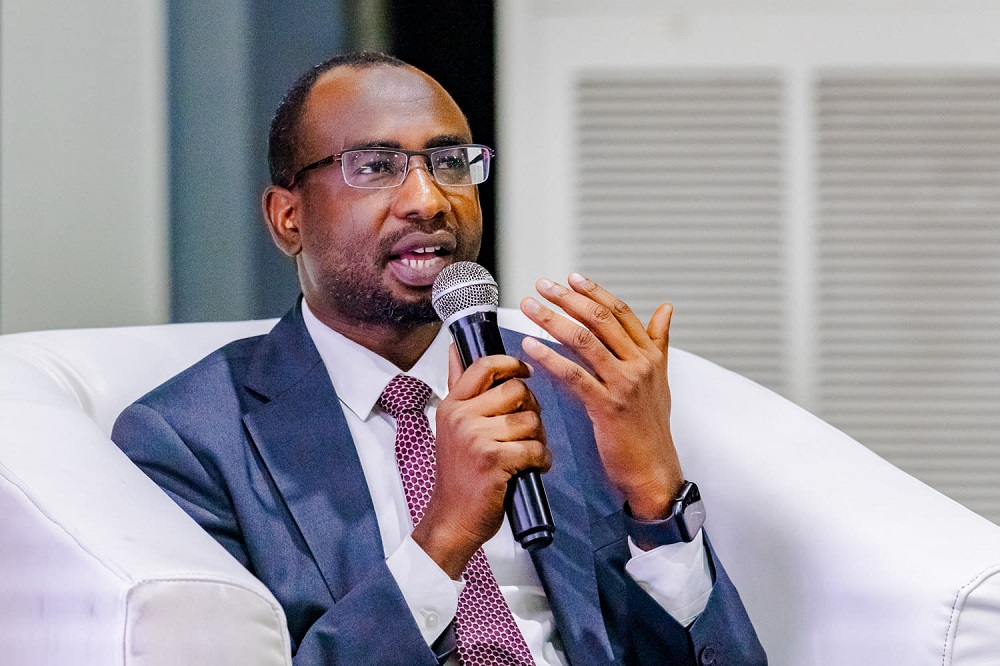Telecom
PPP Will Play a Critical Role in Accelerating Nigeria’s Digital Economy – NITDA DG


Telecom
Airtel Nigeria Commits to Upgrade of its Network Infrastructure for Improved Quality of Service

Airtel Nigeria has unveiled a robust update on a range of network, infrastructure and technology advancements that position the company at the forefront of quality of service leadership in Nigeria’s telecommunications industry.

Announced at its first media roundtable of 2026, the updates reflect sustained investments made over the past 12 to 24 months and signal an accelerated push to stay ahead of surging data demand in a rapidly digitising economy.
Speaking to senior editors and industry correspondents, Airtel Nigeria Chief Executive Officer, Dinesh Balsingh, said the company’s strategy is anchored on deliberate scale, depth and resilience.
“Over the last two years, we have invested with discipline and clarity to strengthen our network nationwide. Those investments are now translating into measurable improvements in performance, customer experience and reach, including in underserved and hard to reach communities,” he said. “In 2026, we are accelerating these upgrades because Nigeria’s data appetite is growing, and leadership in this industry will belong to those who plan ahead.”
At the core of Airtel Nigeria’s quality of service drive is the rapid expansion of its network footprint. Since December 2023, the company has increased the number of network sites by 15.5%, adding 2,242 new sites and bringing its total to nearly 16,711 nationwide. Further deployments are planned in 2026 to strengthen coverage, capacity and resilience across urban and rural locations.
Network capacity upgrades have also reached significant scale. In 2025, Airtel completed capacity enhancements on 30% of its sites, covering over 5032 sites nationwide.
Today, 99% of Airtel Nigeria’s sites deliver high-speed 4G mobile broadband, establishing the operator as a full nationwide 4G network. This year, capacity upgrades are being extended to more sites to sustain performance as data usage continues to rise.
According to Harmanpreet Singh Dhillon, Chief Technology Officer, spectrum depth and optimisation remain critical to network quality. “We have increased our 4G spectrum by 10MHz and we are actively optimising our holdings. These actions allow us to support higher data throughput, better speeds and more consistent service, especially in high-traffic areas,” he said.
Airtel Nigeria is also accelerating its 5G rollout. Over the last three months, the company has more than doubled the number of active 5G sites. The accelerated 5G upgrade happening now will connect the top 20 Nigerian cities to high-speed 5G networks, with a significant part of Airtel’s network in these cities becoming 5G-enabled in the coming year.
Beyond terrestrial infrastructure, Airtel is extending connectivity through space-based solutions. The company has established and signed partnerships with satellite providers OneWeb and Starlink, enabling enterprise-grade connectivity for businesses in remote locations, hard to reach areas and operational outposts. Recently, Airtel announced Nigeria’s first Direct-to-Cell partnership with Starlink, a breakthrough that will allow customers to remain connected while travelling through deep remote areas and enable small rural communities to access Airtel’s digital and fintech services.
The backbone supporting these services continues to expand. Airtel Nigeria has built an extensive fibre footprint across almost all states, developed through years of sustained deployment. Following the announcement to double capital expenditure last year, the company committed to expanding its fibre network by 25%, and intensive rollout activity is ongoing across cities and states. Airtel has also confirmed plans to extend its fibre footprint even further, both within major cities and between states.
A pivotal national milestone is also on the horizon. Nigeria currently relies on a single internet submarine cable landing and breakout point in Lagos. Airtel Nigeria has announced that it will launch a second internet breakout from the South of Nigeria, leveraging the 2Africa submarine cable. In partnership with 2Africa, Airtel will shortly begin carrying internet breakout traffic from Kwa Ibo in Akwa Ibom State.
“This will create a faster and alternative path for large parts of the North and South, improve resilience for the entire ecosystem. Airtel is proud to take the lead in making this happen,” Balsingh said.
Underpinning these advances is a robust IT and cloud backbone. Airtel Nigeria operates an enterprise-grade private cloud with thousands of virtual machines, managing massive storage and compute power across locations.
The infrastructure includes large GPU clusters, supporting AI-driven applications such as fraud detection, intelligent network self-healing and advanced customer analytics.
The company recently announced the upcoming launch of its hyperscaler-ready 38 megawatt data centre in Eko Atlantic. This is designed for Nigeria’s next phase of digital growth, powered by AI.
From a customer access perspective, Airtel Nigeria maintains one of the largest retail footprints in the country. Its products and services are available in over 200,000 outlets nationwide, supported by more than 4,000 exclusive shops across all local government areas and 250 flagship stores.
Balsing added that, “Quality of service today is about resilience, redundancy and intelligence, and that is what Airtel is delivering. From fibre to cloud to satellite-enabled connectivity, we are building a platform that allows Nigerian businesses to scale with confidence, regardless of location.”
He reaffirmed Airtel Nigeria’s long-term commitment to the country. “Our focus is consistent investment, disciplined execution and deep confidence in Nigeria’s future,” he said.
Aside from Singh Dhillon, other members of the Airtel Nigeria leadership on hand with subject matter expertise at the roundtable included Director, Airtel Business, Ogo Ofomata; Director, Marketing, Ismail Adeshina; Director, Information Technology, Kemi Ariyo; and Director, Corporate Communications and CSR, Femi Adeniran.
Telecom
MTN Guns for $2.76bn IHS Towers Buyout in African Telecom Power Grab

MTN Group, the continent’s telecom behemoth, has plunged into advanced negotiations to acquire the outstanding 75 percent stake in IHS Towers for a staggering $2.76 billion, a seismic move that would hand Africa’s largest mobile operator full reins over one of the world’s premier independent tower companies and redefine infrastructure control across emerging markets.

MTN
The proposed transaction, pegged to IHS’s latest New York Stock Exchange closing price where it trades alongside a Frankfurt listing, builds on MTN’s existing 25 percent holding forged in a landmark 2014 deal that saw the operator offload most tower assets to IHS in exchange for cash and long-term leases.
Sources close to the talks confirm discussions remain fluid with no binding agreement yet inked, and both sides caution that negotiations could shift or stall entirely—MTN has signalled readiness to pivot to alternative value-unlocking strategies for its stake if a full buyout eludes grasp.
Strategically, the power play catapults MTN toward vertical integration in a sector where operators increasingly crave direct grip on passive infrastructure to slash lease bills, streamline upgrades, and rocket-roll 4G/5G amid Africa’s insatiable data deluge.
IHS Towers, MTN’s anchor tenant across swathes of Africa with tens of thousands of masts from Nigeria’s 13,500 tenancies—renewed amid naira-dollar tussles—to South Africa and beyond the Middle East into Latin America, represents a golden infrastructure war chest primed for the operator’s 20-nation blitz.
The saga traces to 2014’s seismic sale that freed MTN capital for spectrum wars while birthing enduring lease pacts, now ripe for reversal as governance dust-ups over shareholder nominations and agendas underscore the buyout’s boardroom chess.
Market tremors rippled through IHS shares post-leak, underscoring the $2.76 billion tag’s gravity as MTN eyes cost efficiencies, network agility, and expansion muscle in oil-volatile economies where tower mastery spells survival.
Should the ink dry, MTN vaults to ownership of a colossus fuelling digital bridges from Lagos megacities to rural frontiers, slashing third-party dependence while supercharging investments in fibre-deep data dreams and 5G horizons.
Analysts buzz that the mega-deal heralds telecom consolidation waves, with operators reclaiming tower turf to fortify against rivals and unlock synergies in a landscape where infrastructure crowns kings.
Neither MTN nor IHS commented officially by press time, but the high-stakes huddle spotlights Africa’s telecom arena hurtling toward an era where owning the poles decides who dominates the digital skies.
Telecom
NCC, NSCDC Warn Construction Firms Against Damaging Fibre Optic Cables

Nigerian Communications Commission (NCC) and the Nigeria Security and Civil Defence Corps (NSCDC) have issued a forceful warning to road construction companies, government contractors and civil engineering firms across the country, declaring that the era of unchecked fibre-optic cable damage during excavation works is over, with perpetrators now facing criminal prosecution.

NCC, NSCDC
The two agencies, in a joint statement, highlighted the alarming surge in avoidable fibre cuts caused by negligence, poor planning or outright disregard for infrastructure protection protocols, stressing that such incidents severely disrupt Nigeria’s digital backbone and will attract the full weight of the law moving forward.
They described fibre optic cables as indispensable national assets that fuel the nation’s burgeoning digital economy, ensuring uninterrupted communication services, powering emergency response systems, linking businesses for commerce and trade, and enabling seamless government operations at all levels.
Any destruction of these cables, whether through careless excavation, lack of coordination with telecom operators or deliberate sabotage, directly endangers national security, undermines economic stability and compromises public safety, the organisations warned, painting a grim picture of the cascading effects of even brief network outages on hospitals, financial institutions and security agencies nationwide.
Under the Designation and Protection of Critical National Information Infrastructure (CNII) Order 2024, telecommunication fibre infrastructure has been officially classified as Critical National Information Infrastructure, making any damage from unauthorised digging, construction activities or failure to collaborate with relevant authorities a clear-cut criminal offence punishable under existing statutes.
Individuals, private construction companies and even government contractors found culpable will face immediate prosecution and stiff sanctions as stipulated in the Cybercrimes (Prohibition, Prevention, etc.) Act 2015, with the agencies vowing zero tolerance for what they termed economic sabotage disguised as construction mishaps.
“Future damage to fibre optic infrastructure caused by excavation, road construction or any civil engineering activity conducted without due consultation or collaboration with network operators and relevant regulators will attract strict legal consequences,” the NCC and NSCDC declared categorically, underscoring their resolve to safeguard this vital ecosystem through heightened enforcement.
To forestall further incidents, the agencies implored federal, state and local government bodies, road construction firms, utility service providers and private property developers to adopt proactive measures including thorough pre-construction verification of underground fibre routes using approved mapping tools, early collaboration with the NCC, telecom operators and NSCDC both before and during project execution, strict adherence to national guidelines on excavation procedures and right-of-way management, and prompt reporting of any accidental damage to facilitate swift repairs and minimise downtime.
They emphasised that these steps represent the bare minimum for compliance in an era where digital connectivity is non-negotiable for Nigeria’s progress.
Members of the public have also been enlisted in this protection drive, with calls to report suspected sabotage, vandalism or unintended damage to fibre optic installations at the nearest NSCDC office, via email to [email protected] or [email protected], or by dialling the toll-free line 622 for immediate action.
This collaborative approach, the agencies believe, will not only deter would-be offenders but also foster a culture of accountability among all stakeholders handling earth-moving equipment or infrastructure projects in a country racing towards full digital transformation.

 E-Financial3 days ago
E-Financial3 days agoMajority of Nigerians do not Trust Govt with Tax Revenue – SBM

 News3 days ago
News3 days agoLeadway Assurance Commences Use of Fintech in Insurance Product Distribution

 E-Business3 days ago
E-Business3 days agoNDPC Commits to Balancing Data Privacy, Protection Information

 Telecom3 days ago
Telecom3 days agoMoMo PSB, SMEDAN Forge Pact to Digitise Nigeria’s SMEs

 E-Financial3 days ago
E-Financial3 days agoWhy FirstBank Wrote off N748Bn Bad Loan – Otedola

 Telecom3 days ago
Telecom3 days agoMTN Ignites Teacher Revolution: 5,000 Digitally Armed for Phase Two

 E-Financial3 days ago
E-Financial3 days agoUnity Bank Unwraps Mobile App to Deepen Digital Banking Experience

 General News3 days ago
General News3 days agoFG Partners World Bank, AfDB on Climate Action



























